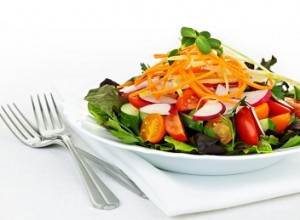By Chris Pedersen
 The news still buzzes over Angelina Jolie’s announcement she had a double-mastectomy to avoid getting breast cancer. She carries the defective BRCA1 gene, which increased her risk for breast cancer to over 80%. Many have called her brave and courageous for undergoing the surgery as a preventative, but was there another option?
The news still buzzes over Angelina Jolie’s announcement she had a double-mastectomy to avoid getting breast cancer. She carries the defective BRCA1 gene, which increased her risk for breast cancer to over 80%. Many have called her brave and courageous for undergoing the surgery as a preventative, but was there another option?
The latest cancer research involves the discussion that environment, including what you eat, affects your genetics. Called epigenetics, this science presumes that outside factors can influence the body to switch genes on and off to stop the growth of cancer and promote health. It seems I’ve been able to prove that point.
In September 2008, after my first colonoscopy, genetic testing revealed I had the MYH gene defect for colorectal cancer. My doctor told me I had a 93% probability for the disease. A panel of doctors recommended I have my colon removed. Totally shocked by their suggestion, I replied, “No way! That would be barbaric. I’ll keep my colon. It works just fine.”
I spent weeks researching my condition and learned all I could about colon cancer and gene mutations. Did you know that BRCA, MYH and FAP are repair genes that are broken? They no longer perform their function of fixing DNA replication problems. Their malfunction frequently leads to cancer in the associated body part. In the case of my defective gene, the MYH leads to colorectal cancer.
Nothing can prepare you for a diagnosis of genetic cancer. The situation weighed heavy on my psyche. I grieved the loss of my health. My lifestyle choices already included avoiding processed foods, sugar, and red meat. When possible I selected organic food to lower exposure to pesticides.
By March 2009, a total of 49 polyps had been removed from my colon. At the same time I read Nature’s Cancer-Fighting Foods by Verne Varona, then began to incorporate cancer-fighting foods into my life and radically changing what I ate and drank. I emphasized eating whole grains, nuts, seeds and raw vegetables and ate little fruit because of the fructose. I also eliminated all food shown to be cancer causing, which included most animal products, chocolate, coffee, processed sugar and alcohol.
 For breakfast, instead of eating organic boxed-cereal, I started eating intact grains, like quinoa, millet and farro. For lunch, I cut up a variety of vegetables and tossed them with olive oil and vinegar. For dinner I would bake wild-caught salmon or mahi-mahi with accompanying roasted vegetables or stir-fry vegetables in a coconut curry sauce. I also began taking a cancer-fighting herbal supplement and B17.
For breakfast, instead of eating organic boxed-cereal, I started eating intact grains, like quinoa, millet and farro. For lunch, I cut up a variety of vegetables and tossed them with olive oil and vinegar. For dinner I would bake wild-caught salmon or mahi-mahi with accompanying roasted vegetables or stir-fry vegetables in a coconut curry sauce. I also began taking a cancer-fighting herbal supplement and B17.
At my fifth colonoscopy, after one year on my new eating regimen, the doctor found no polyps. My colon has been clear for three years. That is an impressive result. And certainly better than removing a perfectly fine body part.
Genetic testing can provide peace of mind, but in my case and Angelina Jolie’s, it led to critical life-changing choices. Be informed. Thoughtfully examine all your options. Ask yourself, “What can I do to help my condition.” Then make your choice and don’t look back.
– As a life-long health enthusiast, Chris Pedersen’s passion for health inspired her to write a series of children’s picture books. The first book, The Prisoner of Carrot Castle, is published as a print book and iPad app (over 40,000 downloads). She blogs about her wellness journey and health issues plus provides healthy recipes at http://www.healthyjourneycafe.com.
